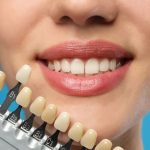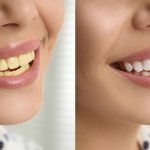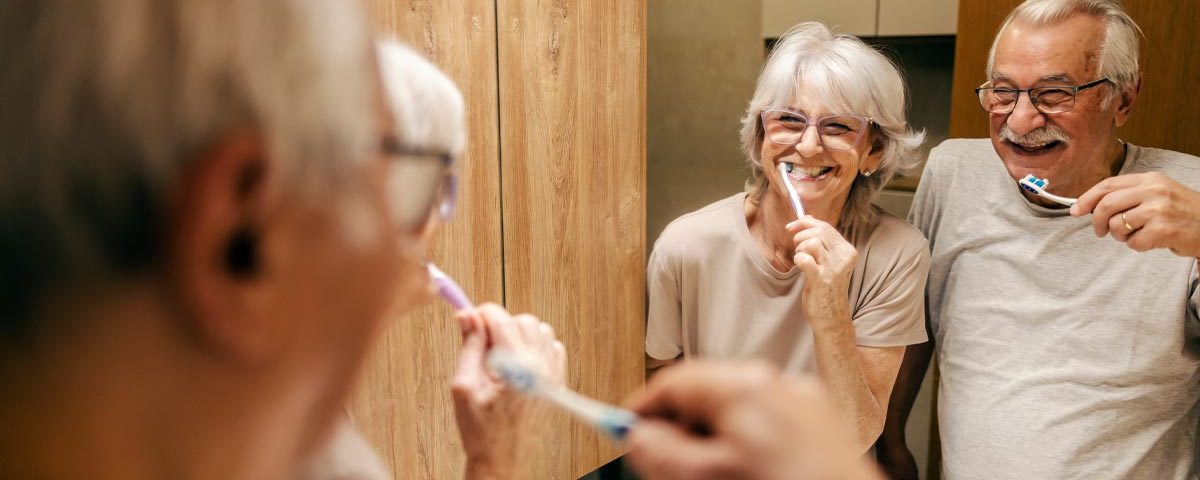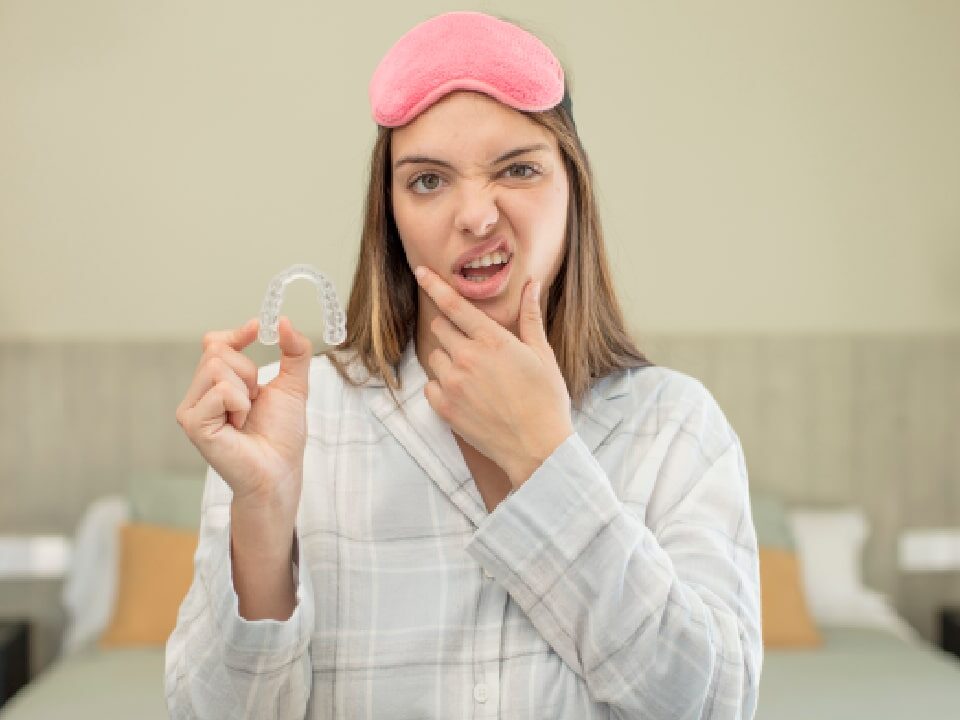
What Are the Differences between Composite Veneers and Prepless Veneers?
June 26, 2025
Tooth Discoloration after Root Canal and Its Treatment
July 3, 2025Getting older can change a lot about your body, and your mouth is no exception. Teeth wear down, gums pull back, and things just feel different. Maybe you’ve noticed your mouth feels dry more often, or you find it harder to chew your food. These changes don’t mean something is wrong with you. It’s just how the body works with time. But the good news is there are ways to take care of your aging and oral health problems no matter your age.
Table of Contents
ToggleHow Does Aging Affect Oral Health?
Yes, aging and oral health go hand in hand. As the years go by, your mouth goes through a lot. Think about all the chewing, brushing, coffee, snacks, and stress over the years; it adds up. Gums might start pulling away from the teeth. Teeth can look longer. Saliva, which helps protect your mouth, may dry up a bit. That dry feeling makes it easier for bacteria to grow. Bacteria are what cause cavities and gum disease.
Some people notice their teeth get more sensitive. Others see more wear and tear on their old fillings. Some take medicines that dry out the mouth even more. All of this makes aging and oral health something we need to watch closely to avoid full-mouth reconstruction Phoenix.
Let’s look at the numbers:
- Around 96% of adults over the age of 65 have had at least one cavity.
- About 68% of people in that age group also have some level of gum disease.
- About 1 in 5 older adults have lost all their natural teeth.
These numbers show just how common these problems are—and why paying attention to aging and oral health is so important.
What are the Dental Problems with Age?
As you get older, your risk for dental problems goes up. That’s not meant to scare you; it’s just something to keep in mind. Let’s go through the most common ones.
Dry Mouth
This is when your mouth doesn’t make enough saliva. It’s not just uncomfortable. Saliva actually protects your teeth by washing away food and fighting bacteria. Many medications can cause dry mouth, including pills for high blood pressure or depression. Without enough saliva, teeth are more likely to get cavities.
Gum Disease
This is also called periodontal disease. Gums get swollen, bleed, and can even pull away from the teeth. With time, it can cause teeth to loosen. Aging makes it harder for the body to fight off infections, and that includes the gums.
Tooth Decay
Older adults often get cavities around the edges of old fillings or on the roots of teeth. The roots don’t have the same protection as the top of the tooth. If your gums have pulled back, your roots may be exposed, making them more likely to rot.
Tooth Loss
Missing teeth can happen because of gum disease or decay. And when teeth go missing, it can make eating harder. It can also change the shape of your face, which can affect your confidence.
Oral Cancer
Oral cancer is a serious aging and oral health problem. It is more common in people over 55. It may start as a sore that doesn’t heal or a strange lump. The good news is that your dentist checks for this during regular visits.
Worn Teeth
After years of chewing and maybe even grinding, teeth get shorter and weaker. You might not notice it right away, but over time, it can change your bite and make your teeth sensitive.
How to Protect Your Teeth and Gum as You Age
Even though aging and oral health problems are common, they’re not something you have to just accept. There are plenty of ways of improving the oral health of older adults for healthy aging and avoiding the need for dental restoration Phoenix:
- Brush your teeth gently two times a day with toothpaste that has fluoride in it. Use a soft brush so you don’t hurt your gums. If your hands feel stiff or shaky, try using an electric toothbrush.
- Floss once a day. If regular floss feels tricky, there are little plastic flossers or water flossers that might work better.
- Use a mouth rinse that helps with dry mouth or kills bacteria. Some mouthwashes also help with bad breath, which is a bonus.
- Drink water often to keep your mouth from getting too dry. Try to limit drinks with sugar or acid, like soda or fruit juice.
- If you smoke, this is a great time to quit. Smoking makes gum disease worse and increases the risk of oral cancer.
- Visit your dentist at least twice a year. If you wear dentures or have implants, they still need to be checked and cleaned.
- Talk to your dentist about a night guard if you grind your teeth at night. Grinding can wear your teeth down faster.
- Ask your dentist if you’re at risk for oral cancer. It’s a quick check but an important one.
When to Call Your Dentist
Call a dentist for aging and oral health problems when:
- You see blood when you brush or floss
- Your gums look red, swollen, or feel sore
- Your teeth feel loose or seem to have moved
- You have bad breath that doesn’t go away
- Your dentures are loose or rubbing
- You have pain when chewing
- Your mouth feels dry most of the time
- You find a sore, bump, or spot that hasn’t gone away after two weeks
Treatments for Age-Related Dental Diseases in Phoenix, Arizona
At Atrium Dental in Phoenix, we take aging and oral health seriously. Our dentists in Phoenix offer treatments made just for the needs of older adults.
We offer dental implants that look and feel like real teeth. We can also give you same-day crowns with our CEREC machine. If your gums need extra care, we provide gentle, deep cleanings and laser therapy to heal them faster.
We also make dentures that are comfortable and look natural. And if you get nervous at the dentist, we offer sedation to make things easier.
If you’re in Phoenix and dealing with any of these issues, come see us. Call us or book your appointment online and start your journey to better oral health.
Importance of Oral Care in Elderly: Let’s Recap
Taking care of your mouth is more important now than ever. Good oral health helps you eat well, speak clearly, and feel better about yourself. It even helps protect your heart and can keep other health problems, like diabetes, under better control.
Aging and oral health go together. But with the right care, your mouth can stay healthy for life. So, if you want a mouth that works well and feels good, spend a little time on your teeth each day. It goes a long way toward keeping you smiling.
FAQs
What are the oral aspects of aging?
They include dry mouth, gum disease, tooth loss, oral cancer, and worn-down teeth.
What happens to your mouth as you age?
Your gums may recede, teeth may wear down, and saliva may decrease, leading to more dental issues.
What is dental aging?
It’s the process of natural changes in the teeth and gums over time, often causing problems like decay and gum disease.
What is the effect of aging on health?
Aging can slow down healing, weaken immunity, and increase the risk of chronic conditions, including oral health issues.



